We recently published a new research guide called From Jim Crow to Black Power: African American History and Culture, 1877-1970 , which is designed to help researchers navigate our holdings on life during the post-Reconstruction, pre-Civil Rights era, as well as the ideas and cultural touchstones that marked the period. Please check it out and tell us what you think!
We have those materials because of the work of pioneering writers and intellectuals who began documenting what the white establishment sometimes forgot or dismissed. In 1926, historian Carter G. Woodson championed the first national commemoration of African American history: Negro History Week. Between that time and the widespread celebration of Black History Month in 1976, there was a growing interest in chronicling and sharing all aspects of African American culture. Literature was a longstanding and especially accessible part of that narrative.
Below are 20 published collections focused on African American (then “Negro” or “Afro-American”) literature — from poetry, prose, and drama to critical and biographical works — all published in the fifty year period between the first Negro History Week and the national recognition of Black History Month. They are listed in chronological order and, where possible, some information is provided about the editor(s). The call number is also given, if you’d like to request the book in our reading room.
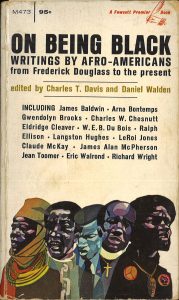 Cullen, Countee. Caroling Dusk: An Anthology of Verse by Negro Poets. Harper & Bros., 1927. [Wade Hall Collection PS591.N4 C8]
Cullen, Countee. Caroling Dusk: An Anthology of Verse by Negro Poets. Harper & Bros., 1927. [Wade Hall Collection PS591.N4 C8]
- Countee Cullen was a poet, and his traditional, romantic aesthetic drew from both black and white culture. (source: article at Poetry Foundation)
Johnson, James Weldon. The Book of American Negro Poetry: Chosen and Edited, with an Essay on the Negro’s Creative Genius. Harcourt, Brace, 1931. [Alabama Collection PS591.N4 J6 1931]
- James Weldon Johnson was a writer, professor, and activist. He is perhaps best known for writing the lyrics to “Lift Ev’ry Voice and Sing” and for the novel The Autobiography of an Ex-Colored Man. He was also an executive secretary for the NAACP. (source: article at Poetry Foundation)
Watkins, Sylvestre Cornelius. Anthology of American Negro Literature. Modern Library, 1944. [Wade Hall Collection PS508.N3 W3]
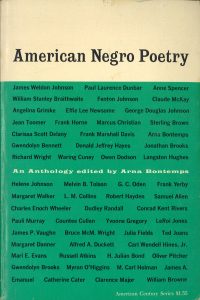 Gloster, Hugh M. Negro Voices in American Fiction. University of North Carolina Press, 1948. [Wade Hall Collection PS374.N4 G5]
Gloster, Hugh M. Negro Voices in American Fiction. University of North Carolina Press, 1948. [Wade Hall Collection PS374.N4 G5]
Hughes, Langston, and Arna Bontemps. The Poetry of the Negro, 1746-1949. Doubleday, 1949. [Special Collections PN6109.7 .H8]
- Langston Hughes was a writer in various genres, including fiction and non-fiction prose as well as drama. He is especially well-known among the general public for his accessible poetry. (source: article at Poetry Foundation)
- Arna Bontemps is an often forgotten but important force in African American literature. He was perhaps most influential as an editor of collections like this one, and as a writer-historian. (source: article at Academy of American Poets)
Hughes, John Milton Charles. The Negro Novelist: A Discussion of the Writings of American Negro Novelists, 1940-1950. Citadel Press, 1953. [Wade Hall Collection PS374.N4 H8]
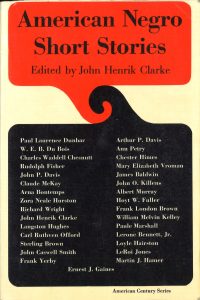
Clarke, John Henrik. American Negro Short Stories. Hill and Wang, 1966. [Alabama Collection PS647.A35 C52 1967x]
Hughes, Langston. The Best Short Stories by Negro Writers: An Anthology from 1899 to the Present. Little, Brown, 1967. [Wade Hall Collection PS647.N35 B47 1967]
Hill, Herbert. Anger, and Beyond: The Negro Writer in the United States. Perennial Library, 1968. [Wade Hall Collection PS153.N5 H5 1968]
- Herbert Hill was a white labor leader in the NAACP and, later, an academic. He helped develop an African American studies department at the University of Wisconsin. (source: New York Times obituary)
Bontemps, Arna Wendell. American Negro Poetry. Hill and Wang, 1969. [Wade Hall Collection PS591.N4 B58 1969]
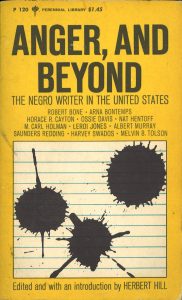
Robinson, William Henry. Early Black American Poets: Selections with Biographical and Critical Introductions. W. C. Brown Co, 1969. [Rare Books Collection PS591.N4 R6 1969]
Davis, Charles T., and Daniel Walden. On Being Black: Writings by Afro-Americans from Frederick Douglass to the Present. Fawcett, 1970. [Wade Hall Collection PS508.N3 D3 1970]
- Charles Twitchell Davis was an academic, the first African American to teach at Princeton and to receive tenure in the Yale University English department. (source: essay by Henry Louis Gates Jr.)
James, Charles L. From the Roots: Short Stories by Black Americans. Dodd, Mead, 1970. [Wade Hall Collection PE1122 .J34]
Wilentz, Ted, and Tom Weatherly. Natural Process: An Anthology of New Black Poetry. Hill and Wang, 1970. [Alabama Collection PS591.N4 N3 1970x]
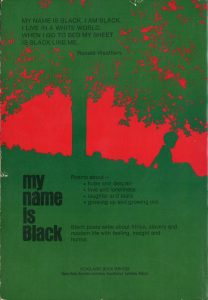
Barksdale, Richard K., and Keneth Kinnamon. Black Writers of America: A Comprehensive Anthology. Macmillan, 1972. [Wade Hall Collection PS508.N3 B35]
King, Woodie, Jr. Black Short Story Anthology. Columbia University Press, 1972. [Alabama Collection PS647.A35 B5 1972x]
- Woodie King is a theater director and producer, founder of Concept East Theatre in Detroit and New Federal Theatre in New York City. (source: bios at The History Makers and Black Past) His writing is usually about the theater industry — see his Black Drama Anthology (Columbia, 1972) in the Gorgas Library’s collection, PS628.N4 K5.
Long, Richard A., and Eugenia W. Collier. Afro-American Writing: An Anthology Of Prose And Poetry. New York University Press, 1972. [Wade Hall Collection PS508.N3 L6 v.1-2]
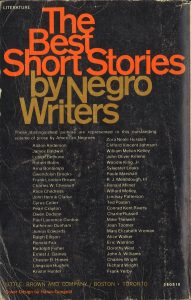 Richard A. Long was an academic and public intellectual who founded the department of African American studies at Atlanta University. He also taught at Emory University. (source: ArtsATL profile)
Richard A. Long was an academic and public intellectual who founded the department of African American studies at Atlanta University. He also taught at Emory University. (source: ArtsATL profile)- Eugenia Williams Collier is a writer and critic, best known for her short story “Marigolds” (1969), for which she won the Gwendolyn Brooks Prize for Fiction from Negro Digest. (source: bio at The History Makers)
Ambrose, Amanda. My Name Is Black: An Anthology of Black Poets. Scholastic Book Services, 1974. [Wade Hall Collection PS508.N3 M95 1973x]
Hatch, James V. and Ted Shine. Black Theater, U.S.A.: Forty-Five Plays by Black Americans, 1847-1974. Free Press, 1974. [Wade Hall Collection PS628.N4 H3]
